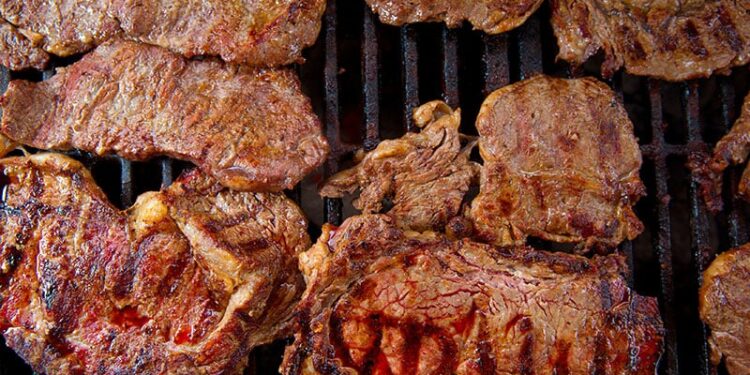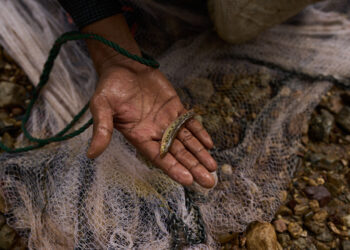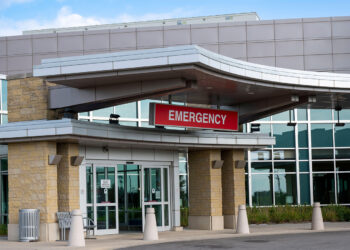Grilling is a classic summer activity in many parts of the world, which brings people together for outdoor dining. However, while it brings people together over flavorful food, certain grilling methods can pose hidden health risks, many of which are preventable. A lesser-known concern is aluminum exposure; when aluminum foils or pans are used to heat salty or acidic foods, aluminum can leach into the food and potentially affect health in the long term. Other risks include the formation of carcinogenic compounds, such as polycyclic aromatic hydrocarbons (PAHs) and heterocyclic aromatic amines (HAAs), as well as the dangers of foodborne illnesses and burn injuries.
Does your choice of grill fuel matter? Absolutely. Gas and electric grills produce fewer harmful substances than charcoal grills, although all types can be safely used with appropriate precautionary measures.
Here are 12 key evidence-based recommendations to ensure a safe and healthy grilling season — no matter where you are in the world.
Prevent fat dripping into flames
Fat is released when meat is cooked. If fat drips onto hot coals or flames, the resulting smoke contains carcinogenic PAHs. To reduce this risk, direct flame contact with food and food positioning to limit dripping should be avoided. Avoid letting the fat char during grilling.
Use grill trays wisely
Salted or seasoned foods grilled in aluminum foil or trays can absorb aluminum, increasing potential health concerns. While the German Federal Institute for Risk Assessment (BfR) acknowledges this risk, it states: “When considering these risks, the occasional use of aluminum trays for grilling meat is justifiable.”
To reduce exposure, the BfR recommends seasoning food after grilling and suggests using stainless steel or ceramic grill trays as safer alternatives to aluminum trays.
Foil use
Wrapping cheese, vegetables, or fish in foil is popular but not risk-free because aluminum may leach into the food. The BfR advises against using aluminum foil to wrap or store acidic or salty foods, such as marinated meat, cheese, or sliced fruit, because of the increased risk for aluminum leaching into the food.
For those who still prefer cooking with foil, the BfR recommends placing a layer of baking paper between the food and the foil to minimize direct contact and reduce exposure.
Choose electric or gas grills
Gas and electric grills are safer from a health perspective because they produce significantly fewer PAHs than charcoal grills. If charcoal is preferred for flavor, safe grilling practices should be adopted to reduce harmful emissions. The German Cancer Society recommends using electric or gas grills whenever possible.
Ensure coals are fully ashed
Wait until the charcoal is fully ashed and no longer burning before placing food on the grill. Not lighting the charcoal with paper, pinecones, or resinous wood can release PAHs and other toxic gases. Charcoal briquettes or natural lump charcoal should be used for the best results.
Keep the grill grate elevated
When charcoal is used, the grill grate should be positioned as high as possible above the coals. This minimizes direct flame contact, prevents charring, and limits the formation of harmful compounds such as HAAs.
Layer baking paper under aluminum foil
Grilling vegetables, cheese, or fish in aluminum foil is common but not risk-free. Aluminum can leach into food, especially when it is used to cook acidic or salty foods. To reduce this risk, it is recommended to use a sheet of baking paper between the food and foil to prevent direct contact and chemical reactions.
Use a two-zone cooking method
Start by grilling food briefly over high heat to sear it and then move it to a cooler part of the grill or wrap it in aluminum foil to finish cooking slowly and evenly. This helps reduce the formation of harmful compounds, such as HAAs, and prevents excessive charring.
Prevent cross-contamination
A separate set of utensils, plates, and cutting boards should be used for raw and cooked foods. Poultry and perishable meat should be refrigerated until just before grilling. Undercooked poultry is one of the most common causes of foodborne illnesses; therefore, extra care is essential when grilling it. Place the poultry directly from the refrigerator onto the grill and cook it thoroughly until the meat is white to gray, even near the bones.
Pork should be fulling cooked because undercooked pork is the leading source of hepatitis E infection.
To avoid cross-contamination, raw meat and poultry should be kept separate from cooked foods. Use different tongs and plates for raw and cooked items.
Marinate for safety
Research from the University of Hohenheim, Stuttgart, Germany, has shown that marinating meat reduces the levels of these harmful compounds. A simple marinade with garlic, thyme, rosemary, cayenne pepper, and a small amount of sugar can reduce HAA formation by up to 74% compared with unseasoned meat. Marinate before grilling to avoid adding salt or acidic components when using aluminum trays or foil.
Disposable grills: Use with care
Disposable grills are small, and charcoal-filled trays with grill grates have become increasingly popular, with demand in Germany increasing by 39% each year. However, their compact size poses a safety risk.
They can become tripping hazards because they sit low on the ground and are easy to overlook. Their light weight also makes them unstable under strong winds, where smoldering embers may be scattered. Accidents involving children have been frequently reported.
To reduce these risks, disposable grills should be placed on stable, nonflammable surfaces — never directly on grass — and should be fully extinguished with water after use.
Avoid grilling cured or smoked meats
Processed meats, such as bacon, frankfurters, Vienna sausages, meatloaf, and smoked pork chops, can form nitrosamines, a class of carcinogens, when heated. They are best cooked using alternative methods or consumed in moderation.
Accidents and First Aid
Barbecue accidents are particularly common during warmer months, with children having the highest risk for such injuries. Therefore, it is essential to maintain a safe distance from open flames and hot surfaces.
One of the leading causes of barbecue-related burn injuries is the use of barbecue lighter fluids, including the dangerous misuse of substances such as rubbing alcohol. These account for nearly three out of four burn accidents at barbecues.
Grease splashes are another common hazard that can cause serious burns, particularly in exposed areas such as the hands, arms, and face.
Anyone who grills should be aware of the basic first aid for burns. The German Society of Plastic, Reconstructive, and Aesthetic Surgery recommends the following:
- Stay calm.
- Cool minor burns under lukewarm tap water (20 °C to 25 °C/68 °F to 77 °F) for 10-15 minutes.
- Do not cool major burns (over 15% of the body surface), burns on newborns, or burns on unconscious patients.
- Contact emergency services in case of serious burn injuries.
- Do not remove clothing stuck to the burnt area.
- For scalds, immediately remove wet clothing, including diapers.
- Flames can be extinguished by rolling on the ground, covering them with a blanket, or using water.
This story was translated from Coliquio.
Source link : https://www.medscape.com/viewarticle/gas-vs-charcoal-which-barbecue-causes-less-harm-2025a1000jef?src=rss
Author :
Publish date : 2025-07-22 13:15:00
Copyright for syndicated content belongs to the linked Source.








